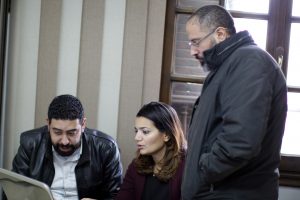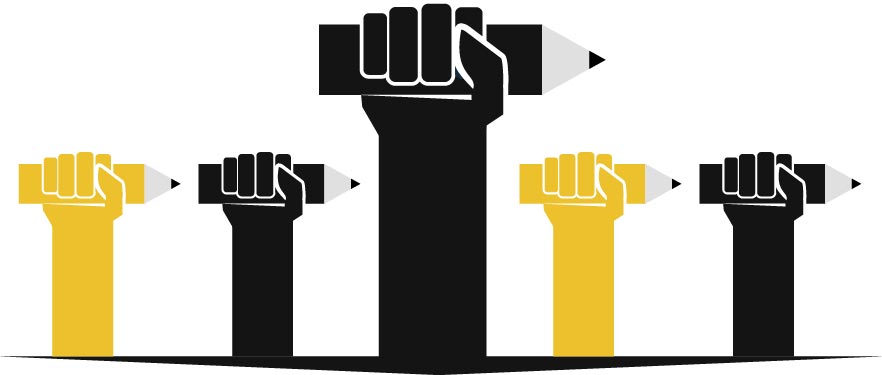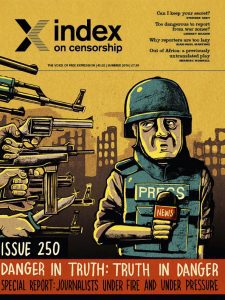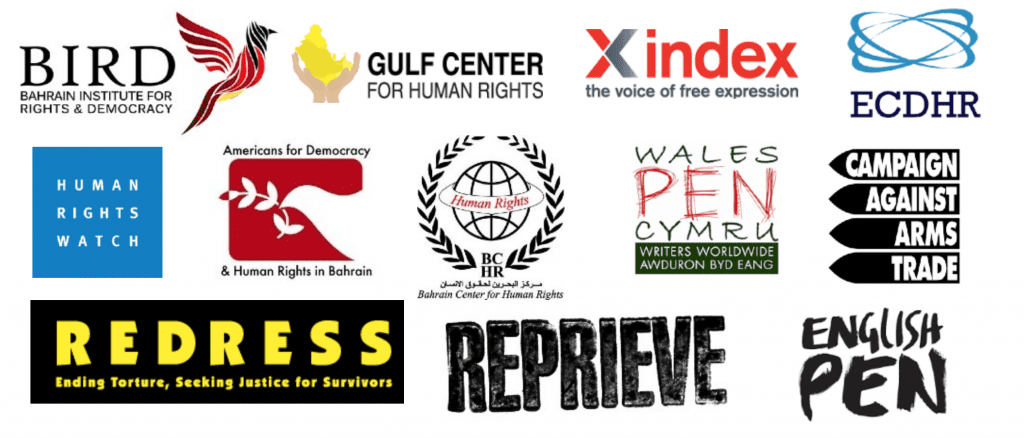26 Mar 2018 | Awards, Fellowship, Fellowship 2018, News
[vc_row][vc_column][vc_video link=”https://youtu.be/7kseuuaARZQ”][vc_column_text]The Egyptian Commission for Rights and Freedoms (ECRF) is one of the only human rights organisations still operating in a country increasingly hostile to dissent and in which countless civil society organisations have been forced to close. The commission coordinates campaigns for those who have been tortured or disappeared, as well as highlighting numerous incidences of human rights abuses.
“Our main goal to achieve in the future, which is stated in our mission, is to empower individuals to acquire their rights, promote a culture of democracy in the Egyptian society, and expand human rights to every home in Egypt,” ECRF told Index. “But in the end of the day we decide to carry out with our work regardless of the challenges because if everyone is silenced this would be the ultimate gain to the current regime, and the ultimate victory to Egypt’s state of fear.”
Between August 2016 and August 2017, the ECRF documented 378 cases of enforced disappearance many of whom were students. The cases of the disappeared are not reported in the heavily censored local media, and the commission’s website and social media sites are some of the few places their plight can be publicised, reported and mapped.
The highly restrictive and repressive environment Egypt has made it increasingly difficult for the organisation to do its work.
Their website was blocked in September in government measures designed to close the organisation down, but the ECRF managed to create a parallel website to maintain their presence and engagement with the public. Twice last year ECRF’s headquarters was raided by security forces with two staff members being arrested. As a result, the staff need help dealing with the risks of being arrested, as well as dealing with the interrogation process and knowing how to protect information.
Over the past 12 months the ECRF has been fighting censorship and defending human rights in two ways. The first is through the criminal justice programme which tackles issues of torture and enforced disappearances in Egypt. It has been particularly focused on the arrest of activists who took part in demonstrations against Egypt’s agreement to cede two uninhabited islands in the Red Sea to Saudi Arabia.

Secondly, ECRF has worked on challenging censorship imposed on student associations in universities. Recently the commission launched an online platform to bring students and practitioners online to discuss a student charter related to freedom of association in universities. The platform was heavily criticised by the ministry of higher education in Cairo, which led to further condemnation of it in official media outlets.
As a direct result of the work ECRF has carried out over the past year, there has been an increased awareness of enforced disappearances, media censorship, the scale of torture, and violations of freedom of association and expression in media and universities.
“ECRF is honored to be shortlisted alongside three peer organizations/campaigns also facing severe human rights challenges in their own countries,” said ECRF. “The international recognition of ECRF’s efforts in campaigning for fundamental freedoms emboldens its members and staff in their resilience to strive for human rights and democracy in Egypt. Regardless of the winner, progress towards equal rights in Russia means progress in Egypt and progress in Kenya means progress in Iran and vice-versa.”
See the full shortlist for Index on Censorship’s Freedom of Expression Awards 2018 here.[/vc_column_text][/vc_column][/vc_row][vc_row full_width=”stretch_row_content” equal_height=”yes” el_class=”text_white” css=”.vc_custom_1490258749071{background-color: #cb3000 !important;}”][vc_column width=”1/2″][vc_custom_heading text=”Support the Index Fellowship.” font_container=”tag:p|font_size:28|text_align:center” use_theme_fonts=”yes” link=”url:https%3A%2F%2Fwww.indexoncensorship.org%2Fsupport-the-freedom-of-expression-awards%2F|||”][vc_column_text]
By donating to the Freedom of Expression Awards you help us support
individuals and groups at the forefront of tackling censorship.
Find out more
[/vc_column_text][/vc_column][vc_column width=”1/2″ css=”.vc_custom_1521479845471{background-image: url(https://www.indexoncensorship.org/wp-content/uploads/2017/05/2017-awards-fellows-1460×490-2_revised.jpg?id=90090) !important;background-position: center !important;background-repeat: no-repeat !important;background-size: cover !important;}”][/vc_column][/vc_row][vc_row][vc_column][vc_basic_grid post_type=”post” max_items=”4″ element_width=”6″ grid_id=”vc_gid:1522065946315-a2955265-bb40-3″ taxonomies=”10735″][/vc_column][/vc_row]
16 May 2017 | Campaigns -- Featured, Digital Freedom, Turkey, Turkey Statements
Pen International, Article 19, the Committee to Protect Journalists, Human Rights Watch, International Press Institute and Reporters Without Borders call the attention of the UN Human Rights Council to the continuous deterioration of freedom of expression and other human rights in Turkey. Following the coup attempt on 15 July 2016, the Turkish authorities have pursued an unprecedented crackdown against perceived critics and opponents. As noted by the UN Special Rapporteur on the right to freedom of opinion and expression following his November visit to the country, counter-terrorism legislation and the prolonged state of emergency are being used to severely restrict fundamental rights and freedoms, stifle criticism and limit the diversity of views and opinions available in the public sphere.
Since the Special Rapporteur’s visit, independent mainstream media have been all but silenced. There are now over 160 media outlets and publishing houses closed down since July 2016 and around 165 journalists and media workers jailed pending trial. Over 100,000 civil servants have been summarily dismissed, with over 47,000 including army, police and teachers jailed pending trial on charges of involvement in the coup plot and of association with the alleged Fethullah Gülen Terrorist Organisation (FETÖ). There has been a rise in allegations of torture or ill-treatment in police custody.
Turkey’s Kurdish population has also been disproportionally affected. The Turkish authorities frequently prosecute non-violent pro-Kurdish political activism or journalism for links with the armed Kurdistan Workers’ Party (PKK). Selahattin Demirtaş and Figen Yüksekdağ, the leaders of the parliamentary opposition Peoples’ Democratic Party (HDP), and other MPs from the party, have been in jail since November 2016. At least 87 municipalities in the southeast have been taken over by the government and their democratically elected mayors and officials removed or jailed. Several Kurdish journalists are incarcerated and most pro-Kurdish media outlets closed.
On 11 November 2016, the activities of some 370 NGOs were arbitrarily suspended, over half of them Kurdish organisations. Among the thousands of academics dismissed are around 400 who signed a January 2016 peace petition calling for an end to army abuses in the southeast.
Restrictions reached new heights in the lead up to Turkey’s contested constitutional referendum on 16 April 2017 which concentrated power in the office of the president. The campaign was marred by the authorities threatening, detaining and prosecuting individuals who voiced criticism of the proposed amendments.
Immediately after the referendum, president Erdogan raised the prospect of reintroducing the death penalty, which would be another disastrous step away from human rights norms for Turkey.
Journalists caught in Turkey’s crackdown
According to the Journalists’ Union of Turkey, an estimated 2,500 journalists and media workers have lost their jobs since July 2016. There are now at least 165 journalists, writers and media workers in prison, making Turkey the biggest jailer of journalists in the world.
Among these are several well-known writers and columnists, including Ahmet Şık, Şahin Alpay, Nazlı Ilıcak, Ahmet and Mehmet Altan, Ali Bulaç, Kadri Gürsel and the editor-in-chief of the opposition daily Cumhuriyet, Murat Sabuncu. Emergency provisions have been used to harass family members of journalists who have fled abroad or gone into hiding, including by cancelling their passports or detaining them in the stead of those accused.
Most detained journalists have been held in pre-trial detention for excessively long periods, facing terrorism charges with no access to the evidence against them and without compelling grounds to justify prolonging pre-trial detention. Indictments against journalists charge them with membership of armed organisations or involvement in the attempted coup without citing any other evidence beyond writings and commentary which neither advocate nor incite violence.
Detainees are only allowed one hour-long consultation with their lawyer a week and under supervision by prison staff, in violation of their right to confidential access to counsel.
As the Special Rapporteur pointed out in his recommendations, “nobody should be held in detention for expressing opinions that do not constitute an actual incitement to hatred or violence”. Moreover, imposing sanctions on individuals solely for criticising the government can never be considered a proportionate restriction on freedom of expression.
Lack of media freedom and pluralism
As stressed by the UN Human Rights Committee, “a free, uncensored and unhindered press or other media is essential in any society to ensure freedom of opinion and expression and the enjoyment of other Covenant rights. It constitutes one of the cornerstones of a democratic society.” States are under an obligation to create a favourable environment where different and alternative ideas can flourish, allowing people to express themselves and to participate in public debates without fear.
The 16 April constitutional referendum took place in a repressive climate. The Organisation for Security and Co-operation in Europe (OSCE) election observation mission noted the “unlevel playing field” and reported major concerns, including restrictions on freedom of expression under the state of emergency, lack of independent media, police interventions, detentions at “No” campaign events and biased use of state resources. Several opposition parties raised concerns about possible election fraud and irregularities and the European Commission called on the authorities to launch transparent investigations.
Our organisations are also alarmed at reports of attacks and arrests directed at voters following the referendum.
Rule of law and independence of the judiciary at risk
Turkey’s judicial system has come under attack since the failed coup. More than 4,000 judges and prosecutors have been permanently dismissed and among them around 2,500 are in pre-trial detention. Turkey’s Constitutional Court has not ruled on the thousands of pending cases relating to dismissals under state of emergency decrees and the government has not yet established its planned ad hoc commission to review the measures.
There are grave concerns that the constitutional amendments passed by referendum will lead to greater political control over the judiciary and further undermine the rule of law in Turkey. One amendment with immediate effect is the president’s ability to exert control over most appointments to the Council of Judges and Prosecutors. The modifications will have a profound impact on Turkey’s Constitutional Court, severely curtailing its ability to serve as an effective check of executive and legislative power and a guarantor of fundamental rights and freedoms.
Politicised court decisions against journalists and, conversely, the removal of judges who have granted bail to journalists have played a central role in the deterioration of press freedom.
Recommendations
The Turkish authorities have repeatedly failed to respect their obligations under Article 19 of the International Covenant on Civil and Political Rights (ICCPR).
In the preliminary observations following his visit to Turkey, the Special Rapporteur urged the Turkish government to take immediate steps to protect freedom of expression, listing a number of concrete measures necessary to achieve this. These still stand.
We urge the UN Human Rights Council to press the Turkish authorities to:
Immediately release all those held in prison for exercising their rights to freedom of opinion and expression;
End the state of emergency;
End the prosecutions and detention of journalists simply on the basis of the content of their journalism or alleged affiliations;
Permit the reopening and independent operation of closed media outlets (including online publications) and halt executive interference with independent news organisations, including in relation to editorial decisions, dismissals of journalists and editors, pressure and intimidation against critical news outlets and journalists;
End the far-reaching crackdown on freedom of expression that has consistently escalated since the failed coup of July 2016;
Uphold the independence of the judiciary;
Investigate all allegations of torture and ill-treatment in detention;
Review the Anti-Terror Law so as to ensure that counter-terrorism measures are compatible with Article 19(3) of the ICCPR;
Reject any proposal to reintroduce the death penalty.
The Association of European Journalists, the European Federation of Journalists and Index on Censorship, NGOs without consultative status, also share the views expressed in this statement.
10 May 2017 | About Index
[vc_row][vc_column][vc_column_text]

The International Bill of Human Rights, consisting of the five core human rights treaties of the United Nations that function to advance the fundamental freedoms and to protect the basic human rights of all people, was entered into force in 1967 by the UN General Assembly.
The documents contained in the International Bill of Human Rights are: the Universal Declaration of Human Rights; the International Covenant on Economic, Social and Cultural Rights; the International Covenant on Civil and Political Rights; the Optional Protocol to the International Covenant on Civil and Political Rights; and the Second Optional Procotol to the International Covenant on Civil and Political Rights, aiming at the abolition of the death penalty
The full declaration sets out the basic rights all people should enjoy and expect from their governments and other governments. The Universal Declaration of Human Rights and the International Covenant on Civil and Political Rights deal directly with freedom of expression.
Article 19 of the Universal Declaration of Human Rights
Everyone has the right to freedom of opinion and expression; this right includes freedom to hold opinions without interference and to seek, receive and impart information and ideas through any media and regardless of frontiers.
Article 19 of the International Covenant on Civil and Political Rights
1. Everyone shall have the right to hold opinions without interference.
2. Everyone shall have the right to freedom of expression; this right shall include freedom to seek, receive and impart information and ideas of all kinds, regardless of frontiers, either orally, in writing or in print, in the form of art, or through any other media of his choice.
3. The exercise of the rights provided for in paragraph 2 of this article carries with it special duties and responsibilities. It may therefore be subject to certain restrictions, but these shall only be such as are provided by law and are necessary:
(a) For respect of the rights or reputations of others;
(b) For the protection of national security or of public order (ordre public), or of public health or morals.
Article 25 of the International Covenant on Civil and Political Rights
Every citizen shall have the right and the opportunity, without any of the distinctions mentioned in article 2 and without unreasonable restrictions:
(a) To take part in the conduct of public affairs, directly or through freely chosen representatives;
(b) To vote and to be elected at genuine periodic elections which shall be by universal and equal suffrage and shall be held by secret ballot, guaranteeing the free expression of the will of the electors;
c) To have access, on general terms of equality, to public service in his country.
[/vc_column_text][/vc_column][/vc_row][vc_row][vc_column width=”1/2″][vc_column_text]

Index on Censorship’s summer magazine 2016
We’ll send you our weekly emails and periodic updates on our events. We won’t share your personal information with anyone outside Index.
You’ll also get access to an exclusive collection of articles from our landmark 250th issue of Index on Censorship magazine exploring journalists under fire and under pressure. Your downloadable PDF will include reports from Lindsey Hilsum, Laura Silvia Battaglia and Hazza Al-Adnan.[/vc_column_text][/vc_column][vc_column width=”1/2″][gravityform id=”20″ title=”false” description=”false” ajax=”false”][/vc_column][/vc_row][vc_row][vc_column][vc_custom_heading text=”More information about freedom of expression”][vc_column_text]Why is free speech important? Freedom of expression is a fundamental human right. It reinforces all other human rights, allowing society to develop and progress. The ability to express our opinion and speak freely is essential to bring about change in society.
Why is access to freedom of expression important? All over the world today, both in developing and developed states, liberal democracies and less free societies, there are groups who struggle to gain full access to freedom of expression for a wide range of reasons including poverty, discrimination and cultural pressures. While attention is often, rightly, focused on the damaging impact discrimination or poverty can have on people’s lives, the impact such problems have on free expression is less rarely addres[/vc_column_text][/vc_column][/vc_row][vc_row][vc_column][vc_basic_grid post_type=”post” max_items=”4″ element_width=”6″ order=”ASC” grid_id=”vc_gid:1494247299440-5e8d8e06-86b1-1″ taxonomies=”9210″][/vc_column][/vc_row]
4 Dec 2016 | Bahrain, Bahrain Statements, Campaigns, Campaigns -- Featured, Middle East and North Africa, Statements
[vc_row][vc_column][vc_column_text]
Theresa May
Prime Minister
10 Downing Street
London
SW1A 2AA
Cc: Boris Johnson
Secretary of State for Foreign and Commonwealth Affairs
King Charles Street
London
SW1A 2AH
December 4, 2016
Dear Prime Minister,
The undersigned organisations are writing to you in advance of your trip to Bahrain on 6 December to express our concerns over the deteriorating human rights situation in the country and the UK government’s abject failure to exert any positive influence in this regard.
After your meeting with King Hamad at 10 Downing Street on October 26, 2016, when he invited you to be the “guest of honour” at the Gulf Cooperation Council Leaders’ Summit, your office issued a statement referring to “the progress that had been achieved through the King’s ongoing domestic reform programme.”
Unfortunately, there is no evidence to support any claims of progress where human rights are concerned. In fact there has been a marked deterioration in the human rights situation in Bahrain since June 2016, when the authorities dissolved the main political opposition group, al-Wifaq, jailed the country’s leading human rights activist, Nabeel Rajab, and harassed and prosecuted Shia clerics who peacefully protested the arbitrary revocation of the citizenship of al-Wifaq’s spiritual leader, Sheikh Isa Qasim.
In November, authorities charged Ebrahim Sharif, a prominent political activist, with “inciting hatred of the political system” after he criticised Bahrain’s government and a state visit to Bahrain by Britain’s Prince Charles, which was undertaken at the request of the British government. Although authorities have reportedly dropped these charges against Sharif, Nabeel Rajab remains detained on spurious charges and the government has denied his requests to be freed on bail while judicial proceedings continue. He faces charges that on the face of it solely relate to his peaceful criticism of Bahraini government policies, including Bahrain’s participation in the Saudi-led coalition’s airstrikes in Yemen and alleged torture of prisoners in the country’s largest prison. It is extremely disappointing that the UK has not called for Nabeel Rajab’s release, or indeed the release of any dissidents who are in jail solely for expressing their rights to free expression and assembly.
In response to a Freedom of Information request submitted by the Bahrain Institute for Rights and Democracy in April 2015, the UK Foreign and Commonwealth Office stated that the UK has provided the Bahraini authorities with a package of technical assistance, funding, and training, “focused on strengthening the oversight mechanisms responsible for investigating allegations of torture and mistreatment and supporting the reform of detention procedures in Bahrain.” However, as a November 2016 report by Amnesty International and a 2015 report by Human Rights Watch made clear, authorities have made little progress in holding officials accountable for the mistreatment and torture of detainees.
According to Amnesty International, “the UK government’s portrayal of the Ombudsman and the Special Investigations Unit as model institutions is utterly disingenuous”. We also have concerns that Bahrain may soon break a five-year de facto moratorium on the death penalty. Mohammed Ramadan and Husain Ali Moosa are both facing the death penalty despite the fact that their convictions hinge almost entirely on confessions that they retracted and which they claim were extracted after torture. In the case of Mohammed Ramadan, an investigation by Reprieve and the Bahrain Institute for Rights and Democracy demonstrated that the Ombudsman sent misinformation to the FCO, claiming not to have received torture complaints, a false claim that FCO Minister Tobias Ellwood then repeated in response to a written question from Tom Brake MP.
Your status as the guest of honour at this summit is a clear reflection of the close alliance that the UK government now enjoys with the government of Bahrain and the other Gulf Cooperation Council states.
The Bahraini authorities’ orchestrated attack on the rights to free expression, assembly and association, has seriously undermined the prospects of a political solution to Bahrain’s domestic unrest. If your government is serious about its commitment to encouraging reform and dialogue, you should use this influence to press the government of Bahrain to put an immediate stop to this repression. We urge you in particular, as part of this trip, to urge your Bahraini hosts to release Nabeel Rajab and other the political detainees without whom no process of dialogue will be possible.
Yours,
Americans for Democracy & Human Rights in Bahrain
Bahrain Center for Human Rights
Bahrain Institute for Rights and Democracy
Campaign Against Arms Trade
English Pen
European Centre For Democracy and Human Rights
Gulf Centre for Human Rights
Human Rights Watch
Index on Censorship
Redress
Reprieve
Wales Pen Cymru
[/vc_column_text][/vc_column][/vc_row][vc_row][vc_column][vc_basic_grid post_type=”post” max_items=”4″ element_width=”6″ grid_id=”vc_gid:1481021954644-66a7548e-2d8b-9″ taxonomies=”716″][/vc_column][/vc_row]





